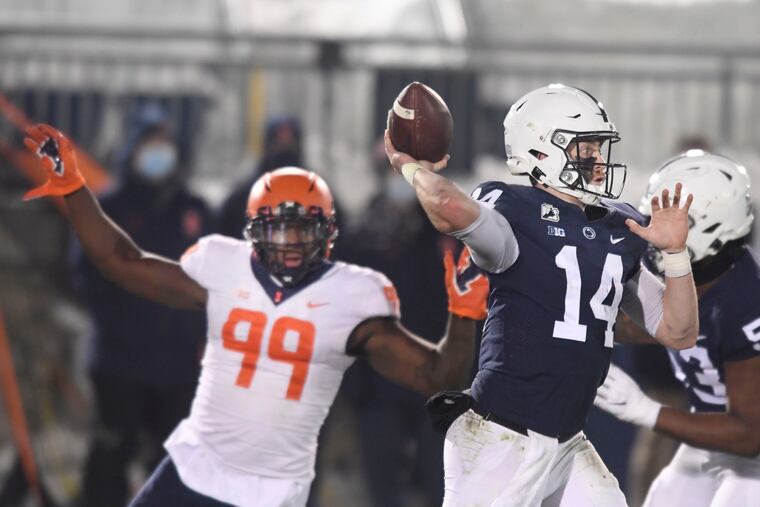The Big Ten says any team that can’t play a game due to COVID-19 will forfeit
The ACC, Pac-12, and Big 12 have similar policies. The SEC says it might announce its policy soon.

The Big Ten Conference announced Monday a forfeiture policy that will assess a loss to any team unable to compete in a league competition on the day it is scheduled because of COVID-19.
Under the policy, the opponent of the team having to forfeit would be credited with a win, and the game would not be rescheduled.
The conference said if a game cannot be contested on the day on which it is scheduled because both teams are unable to participate because of COVID-19, and there is no chance of rescheduling, the result will be ruled a “no contest.”
» READ MORE: Penn State has five talented running backs, but who will get the most playing time?
Speaking Saturday before the policy was officially announced, Penn State vice president of athletics Sandy Barbour said the Big Ten would “revert back to what our forfeiture policy has always been as a conference.”
“Although perhaps not ideal, given the health and science nature of COVID, it’s probably the right thing to do,” she said.
During its abbreviated conference-only football season in 2020, the Big Ten postponed 13 games, two of which were rescheduled but could not be played, but no forfeit losses were assessed. Only Penn State and Rutgers played their full nine-game schedules without interruption.
The ACC, Pac-12, and Big 12 have similar policies for forfeits if one team cannot field enough players for a game because of COVID-19. The SEC said it may wait until the week of the first game before revealing its rules on forfeits.
The announcement of the forfeiture policy comes about a month after Big Ten commissioner Kevin Warren outlined the method for which it would be implemented after member institutions adopted its plans and procedures for the fall.
» READ MORE: Penn State safety Jaquan Brisker returns to team for one reason: Making amends for last year
“We’ll get that information, we’ll combine it, and then we’ll get together with our chancellors and presidents and other key constituents to make the determination as far as how we handle the fall,” Warren said July 22 at the Big Ten football media days.
“It will be a decentralized decision-making process. As soon as we gather all the information from our schools in early August, we’ll finalize our policies to make sure that we pressure-test it as much as we possibly can and then we’ll make sure we release it to everyone in the media and in the public.”
» READ MORE: Franklin excited about Penn State’s revamped offense under new coordinator Mike Yurcich